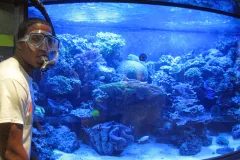An Intern Explores Ocean Careers

I’m a high school student interested in pursuing marine science. I have loved the ocean since I was 3 feet tall and only getting my feet wet at the beach. I’m a senior in high school, and over the next year I have the task of selecting a college, but I’m also thinking about my major and future profession. I know how hard it can be trying to figure out what career you would like to pursue especially with sports, school clubs, and television influencing your decision.
If you love the ocean, but also have a passion for another field I am here to help you. This summer I have had the opportunity to intern with the Smithsonian Ocean Portal. It has allowed me to get my feet wet in another way. I have been introduced to more fields in marine science than I ever knew existed. Did you know you could combine ocean science with other fields? I just learned this information a year ago. Many people figure this out in college and it’s nearly too late to change majors without repercussions. I’m letting you know this information now, so you can prepare for the future.
Ocean + Biology = Marine Biology
Marine biology is the study of organisms in the ocean. Try not to get marine biology confused with aquatic biology, which studies freshwater organisms. As a marine biologist you will not only study the animals and plants, but also their habitat. Marine fishery scientists and marine zoologists are considered marine biologists. This summer I met with a number of marine biologists including, Chris Mah, an echinoderm expert, and Michael Vecchione, director of the NOAA Fisheries National Systematics Laboratory. As you continue to read this blog you will find out that marine biologists work with all types of people ranging from oceanographers to environmental lawyers.
Ocean + Engineering = Ocean Engineering
Ocean engineering is a special branch of engineering that deals with the development of equipment and techniques to explore and assess the ocean floor and other habitats of the ocean. It combines the disciplines of marine biology, oceanography, and engineering. This video from Woods Hole Oceanographic Institution (WHOI) shows how ocean engineers quantified how much oil was spewing from the broken well during the Gulf of Mexico oil spill of 2010. There are multiple organizations that hire ocean engineers including oil companies, the United States Navy, and major ocean agencies like NOAA.
Ocean + Physics = Oceanography
Oceanographers study ocean currents, waves, plate tectonics, ecosystems, and fluxes of the ocean. The ocean is like a cake with different layers that oceanographers study. There are four main subcategories of oceanography: chemical oceanography, geological oceanography, physical oceanography, and biological oceanography. Many entities want to hire oceanographers, such as the U.S. Navy, oceanographic institutions, and universities.
Ocean + Microbiology = Marine biotechnology
Marine biotechnology involves studying the molecular biology of marine organisms to protect human health and improve seafood production. The NOAA Ocean Today video Medicines From the Sea is a great example of how marine organisms produce chemicals that help humans. Federal agencies, non-governmental organizations, and universities hire marine biotechnologists to help solve problems like antibacterial resistance.
Ocean + Forensic Science = Marine forensics
Many federal law agencies and coastal police agencies require forensic analysis to investigate illegal fishing and false labeling of seafood. If a protected marine animal is recovered without fins, scales, or a head attached to facilitate identification, marine forensics officials may be contacted to analyze and identify the specimen.
Ocean + Law = Environmental Lawyer
Environmental lawyers argue and negotiate lawsuits having to do with numerous environmental concerns. You will have to attend law school to become an environment lawyer. Some environmental lawyers will work with other lawyers from around the world and form treaties to protect the ocean. They develop rules and laws about fisheries, animal trading, clean water, and coastal zones.
Ocean + Filming = Underwater Filmmaker
Underwater filmmakers tape and photograph organisms beneath the sea. Underwater filmmaking gives the public an opportunity to see a world they don’t normally see. Underwater filmmakers play a vital role in research and education. To become an underwater filmmaker you must have a broad knowledge about color, lights, angles, and experience with cameras. And you may also need a scuba diving license. Magazine, television, and movie producers often need underwater filmmakers.
Ocean + Communication = Environmental Communicator
Environmental communication is communication about environmental affairs and issues. As an environmental communicator you may talk to the public, groups, and elected officials about protecting the ocean. Communicators also spread the word around the world and influence people. The amazing staff of the Smithsonian Ocean Portal are environmental communicators.
Even with all this information I am still unsure which career I would like to pursue. I’m leaning toward oceanography, but ocean engineering sounds fun, too. I am still undecided and understand that patience is the key. My career is something that I may be doing for more than 30 years. I want to enjoy it!
Here are some links that helped me with my search:

